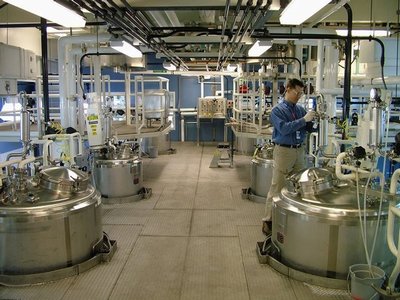October 7, 2010
UW and Amgen: Working together to help professionals advance their biotech education
Biotechnology professionals in Seattle have a new option for earning an advanced scientific degree.
The master’s in pharmaceutical bioengineering is a new part-time degree that was developed in partnership with the UW Department of Bioengineering, UW Professional & Continuing Education (UWPCE), and Amgen.
“This degree is tailored to the biotechnology industry and can give someone more confidence and skills to be successful at managing diverse areas — from being an expert in research, contributing to the development process, or answering regulatory questions,” said Victor Fung, executive director of product development at Amgen.
Professional biotechnology programs at universities are becoming more common across the country. According to a recent Nature article, the number of biotechnology and pharmaceutical programs at two-year colleges has been increasing since 1998. In addition, part-time master’s degree programs are currently offered at Harvard University Extension School, University of Pennsylvania and Johns Hopkins University.
Seattle is home to several biotechnology, pharmaceutical and global health companies. The Amgen Helix campus in Seattle employs approximately 800 scientists, engineers, project managers and IT professionals.
The UW master’s in pharmaceutical bioengineering is designed specifically for working professionals, because it is challenging to earn an advanced scientific degree while working full time. Fung points out that professional scientists typically opt to earn a master’s in business administration when choosing advanced education, partly because most of those programs are designed to accommodate a work-life balance.
“While there are benefits to advancing one’s education in the business side of the biotechnology industry, I wanted to give professionals and good scientists a chance to stay on the scientific path and drive innovation,” Fung said.
This degree program provides students with a scientific understanding of how the processes within a biotechnology company work. It has three tracks: basic bioscience, drug discovery and design, and translational pharmaceutics. Overall, the curriculum provides core knowledge courses for those wanting to pursue science careers but who may not already have a science background, as well as courses for scientists wanting to learn about new fields of interest, such as pharmacodynamics. Therefore, students can decide how to expand their scientific understanding of the industry.
For example, engineers in manufacturing who want to understand the science behind how an experiment is designed can choose a track that deepens their scientific understanding. On the other hand, scientists who want to lead a multidisciplinary team can choose a track that broadens their knowledge of manufacturing and regulatory affairs.
The value of a degree designed in partnership with a company like Amgen can extend to other companies in the Puget Sound region. Fung said Amgen is not unique in its mission to make medicines that improve people’s lives, or in its commitment to help staff achieve their career goals. The curriculum can also be beneficial to employees of smaller biotech companies, where employees might have to be responsible for three or four different projects or processes.
The program also provides networking opportunities for professionals either long established in or new to the local industry.
“The feedback from the first cohort of students has been positive,” said Eric Irvin, assistant director of academic programs for UWPCE. “Students have enjoyed learning from other professionals who are specialized in different disciplines within the field of biotechnology. They’ve also expressed appreciation for how the course format and schedule balances with their work and business travel schedule.”
In addition to benefiting those already employed in the industry, this degree can be potentially helpful to professionals — whether they are coming from health care or IT — who move into the biotech community. They learn firsthand from local experts and professionals about how the industry works, and how they can contribute to a company.
The skill sets for biotech professionals often evolve alongside emerging technologies and scientific discoveries. Looking forward, Fung and the UW are interested in adding new certificate tracks that address emerging disciplines in biotechnology, such as personalized medicine and nanotechnology. In science, keeping up-to-date with the latest technologies and discoveries is critical to stay viable in your career.



